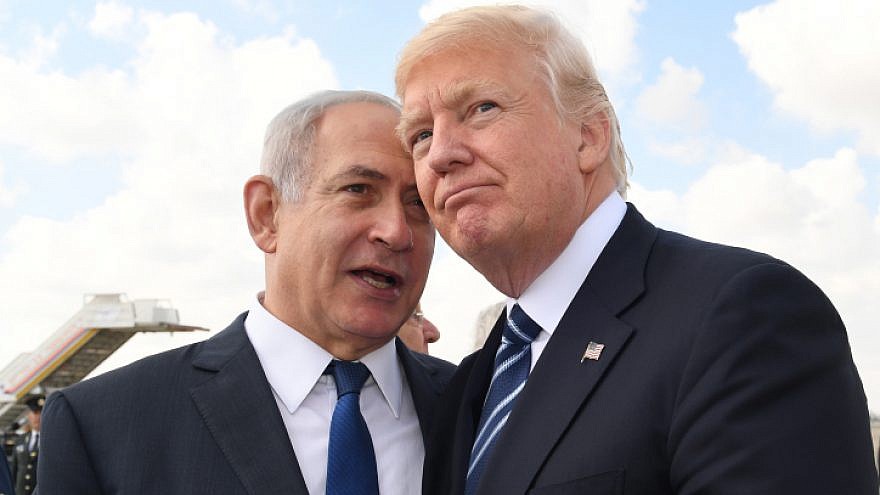After years of rumors, leaks, a bitter politicized debate and endless delays, Israeli Attorney General Avichai Mandelblit finally announced that Prime Minister Benjamin Netanyahu was to be indicted on charges of bribery, fraud and breach of trust in three separate cases. It caused Netanyahu’s opponents to celebrate and his supporters to rage against what they believe is an unfair process. It also left everyone wondering how this unprecedented development would impact the already confusing stalemate that has left Israel without a governing coalition and on the brink of a third election within a year.
Coming as it does now, the indictments raise obvious parallels with the efforts by Democrats to impeach Netanyahu’s political ally, President Donald Trump.
In both cases, a conservative leader is being pursued on what their foes purport are corruption charges, but which their supporters believe is a thinly veiled attempt to criminalize political differences. Detractors of both Netanyahu and Trump believe that the investigations into their respective behavior are a defense of ethics, government accountability and democracy itself. Their supporters feel that the charges, even if they were true, are infractions that are too trivial to be prosecuted and are, in any case, flimsy excuses cooked up to discredit a politician that they weren’t otherwise able to defeat at the polls.
Democrats think they are holding Trump accountable for illegal behavior in dealing with Ukraine, while Republicans dismiss the seriousness of the allegations and think the only purpose of the impeachment investigation is to try to damage the president they despise on the eve of his re-election campaign. Their disagreement is not only about the facts of the case, but also about the whole point of the exercise.
His enemies speak of the three cases against Netanyahu as grievous crimes. But it’s hard to portray them as anything but tissue-thin charges that seem unlikely to stand up in a court of law. In one, he is accused of accepting expensive gifts of champagne and cigars with no obvious quid pro quo involved. The other two involve Netanyahu’s attempts to persuade media barons to give him favorable coverage; in neither case did the effort succeed. Nor is there any specific law prohibiting such efforts even if a deal was struck.
No one should be above the law, and it’s hard to prove that anyone behind the pursuit of Netanyahu was motivated by political objectives. Yet these indictments seem contrived. They appear more a case of officials searching for a pretext to prosecute a specific person rather than the result of an investigation into an actual crime or selective prosecution. And the cheers from the Israeli left have little to do with a defense of the rule of law and everything to do with the prosecutors having done more to take down Netanyahu than his political opponents have ever achieved. Over and above the effort to oust him now, there’s no denying that the impending indictments damaged his prospects in the two elections held this year.
What is different about the two leaders’ problems is that it is not a Knesset committee that is hounding Netanyahu. It is the Israeli police and the public prosecutor’s office—now backed up by an attorney general who was once an aide to the prime minister—responsible for the indictments.
Although the law doesn’t require Netanyahu to resign if he is indicted, it is very difficult to imagine anyone governing with legal charges hanging over him. Even a favorable resolution of the case can’t happen quickly enough to prevent him from suffering the possible consequences of the indictment in terms of his deposition by the Likud or being rejected by voters at the next election in the spring. As a result, it seems highly likely that his long run in power will end sometime in the next several months.
By contrast, Trump is subject to what is essentially a political process, in which a narrow partisan majority can impeach a president in the House of Representatives, but only a super-majority (67 votes) can mandate his removal from the presidency if the Senate convicts him. And since there is no bipartisan consensus about the gravity or even the criminality of his behavior, Trump will remain in office no matter what happens in the House.
The nature of the charges is also very different.
Trump is accused of abusing the powers of his office and official misconduct. Netanyahu is being prosecuted for personal behavior in terms of accepting gifts, as well as political maneuvering in the case of his attempts to persuade media outlets to give him favorable coverage.
Viewed objectively—and even if one rejects the Democrats’ accusations—Trump’s alleged offenses are more serious than those hurled at Netanyahu. But the Israeli leader’s legal and political prospects are far dimmer than those of the American president, who will almost certainly serve out his term and still have a reasonable chance of re-election in spite of the clamor against him.
At the heart of both controversies is a political divide that will never be bridged by legal arguments for or against either man’s conduct. Whatever you think of the conduct of either man, both impeachment and the indictments seem more like efforts to influence or supersede the political process by legal means than a quest for justice. Indeed, it’s difficult, if not impossible, to assert that the attempts to depose them are completely unrelated to politics.
So long as such efforts are not backed by a broad consensus that crosses party lines—rather than only by those who are happy to see Netanyahu and Trump taken down by any means, be it political or legal—both processes will be tainted and viewed as political exercises. Whatever the ultimate outcome of either impeachment or the Netanyahu charges, the warring camps will never accept an outcome that goes against them. And that is a tragedy for democracy in the United States and Israel.


























